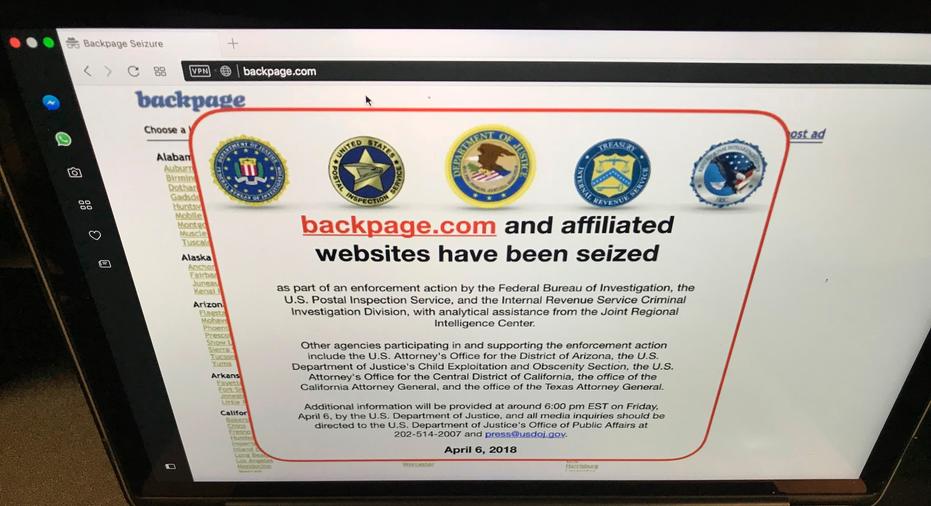AP News Guide: Bill to fight online sex trafficking

NEW YORK – A 1996 law that shields online services from being liable for what their users do would be weakened by a sex-trafficking bill awaiting President Donald Trump's signature.
The law is what allows Facebook, Google and other leading companies to provide communications services. A company that hosts blogs doesn't have to worry about being sued for defamation, for instance, when a user posts nasty things about someone. Likewise, Facebook doesn't have to worry if someone shares advice that turns out to be harmful. In both cases, it's the user who is liable.
But the same provision also has given classified-ad sites such as Backpage protection against accusations that they promote sexual exploitation of minors and prostitution.
Here's a look at the bill that would lift those protections. It passed Congress with broad support, despite concerns over speech rights.
___
THE IMPETUS
The legislation grew out of frustration that classified-ad sites can claim they aren't the publisher of questionable content but are merely transmitting content posted by others.
One of the bill's chief sponsors, Republican Sen. Rob Portman of Ohio, told Senate colleagues in January that trafficking sites have "the ability to say 'you can't touch us. You can't go after us.'"
The 1996 provision doesn't bar federal criminal prosecutions. A federal indictment unsealed Monday accuses the founders of Backpage and five others of facilitating prostitution by running ads for sexual services and hiding their revenues. Federal law enforcement authorities seized Backpage.com's domain name on Friday.
But people seeking civil damages from the sites have been frustrated by the 1996 exemption. That law also limits the ability of states from bringing their own criminal cases. The new legislation would make it easier to bring civil and state cases against these sites.
___
THE SUPPORT
Leading tech companies, through the industry group Internet Association, and celebrities such as Amy Schumer and Seth Meyers have expressed support for the new legislation. So has Trump's daughter, Ivanka.
While Facebook benefits heavily from the 1996 protections, its chief operating officer, Sheryl Sandberg, wrote that the bill "allows platforms to fight sex trafficking while giving victims the chance to seek justice against companies that don't."
Despite the divisive political climate, both chambers of Congress passed the bill overwhelmingly — 388-25 in the House and 97-2 in the Senate.
"Any bill that is about combating sex trafficking is going to be difficult to oppose," said Eric Goldman, a Santa Clara University law professor who is critical of the bill.
___
CONCERNS OVER UNINTENDED CONSEQUENCES
Critics worry that without the 1996 protections, sites might decide it's not worth offering their services at all or might be too aggressive in censoring posts to avoid lawsuits. They say the impact would go beyond sex-related content, even though the bill is supposed to preserve immunity for other posts.
Already, the classified site Craigslist has killed its personals section. "Any tool or service can be misused. We can't take such risk without jeopardizing all our other services," Craigslist wrote.
Another possible outcome, critics say, is that companies will stop moderating their services for abuses altogether, not just sex trafficking. The new bill adds language to broaden sex trafficking to include "knowingly assisting, supporting, or facilitating" it. The fear is that a website might "know" about such conduct if comes across it while moderating the services for something else. Better to turn a blind eye altogether, the thinking goes.
The biggest effect will be on smaller services without resources to navigate the intricacies of the new rules, said Emma Llanso, director of the Free Expression Project at the Center for Democracy and Technology, one of several civil-rights groups opposing the legislation.
The Justice Department supports the bill, but has expressed concerns that it might be unconstitutional because changes would apply retroactively.



















